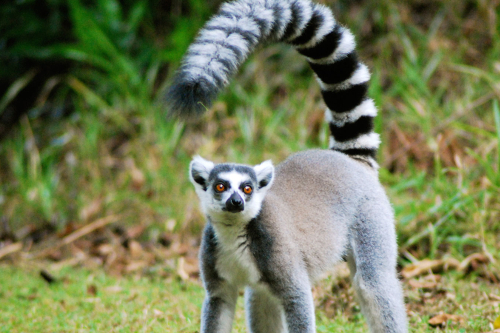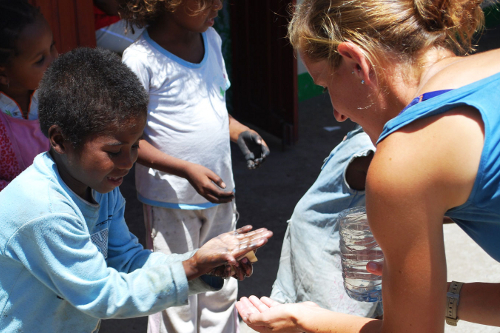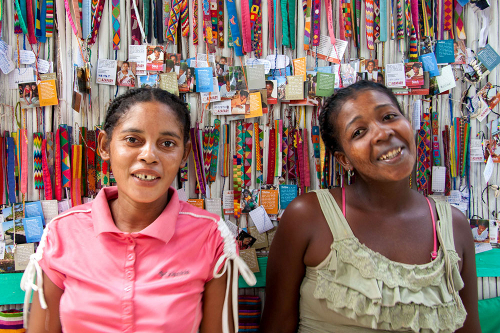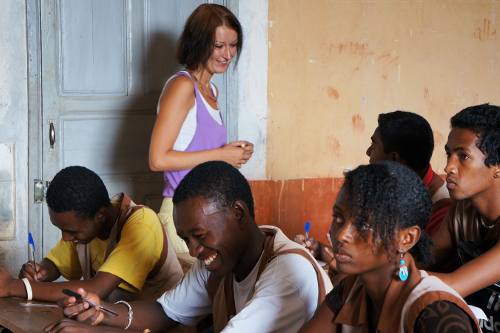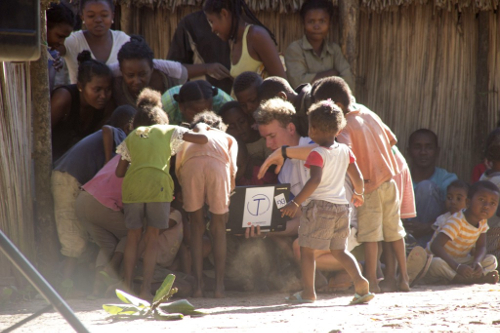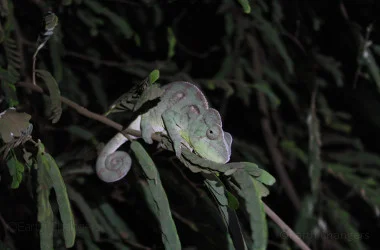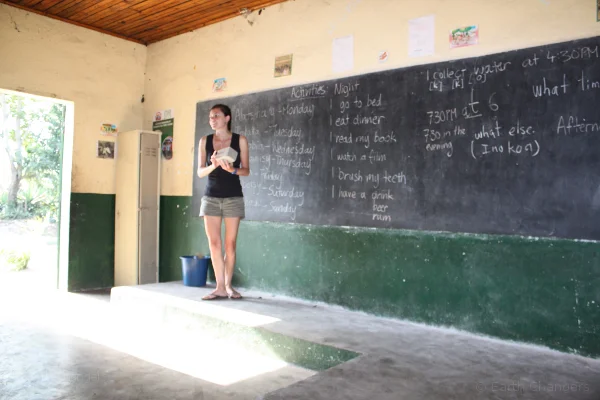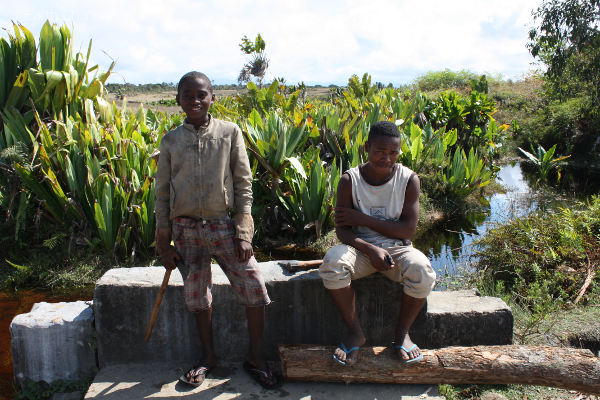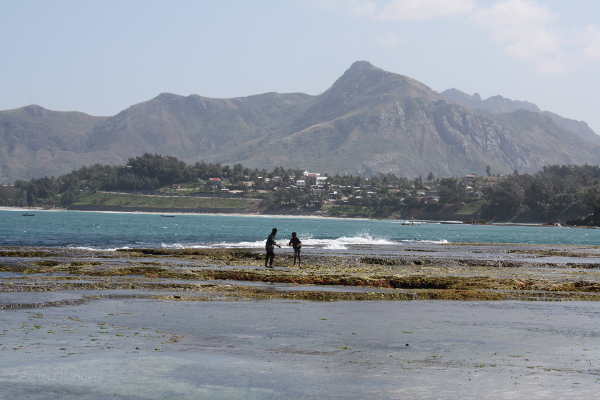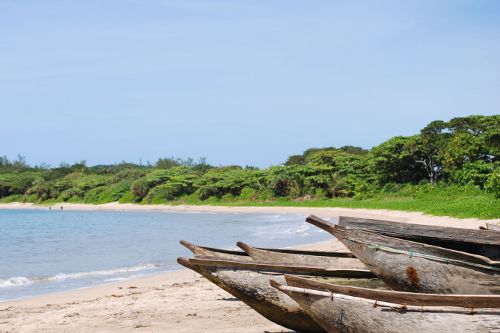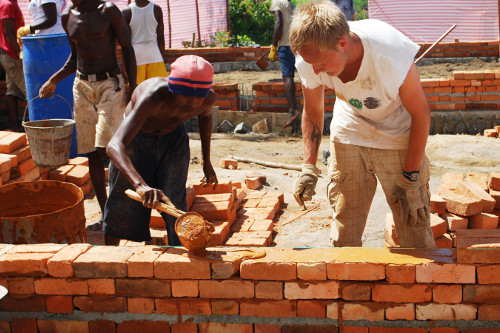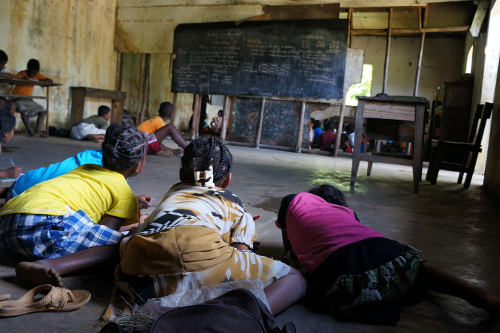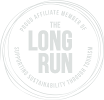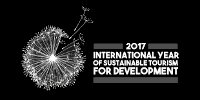Join SEED Madagascar's award- winning sustainable development
Support conservation and community development to preserve one of the planet's most unique and endangered environments and tackle extreme poverty.
This vital local charity need overseas volunteers to help support its grassroots projects. You can have an invaluable unforgettable experience hands-on in development, working alongside Malagasy communities on their own sustainable solutions for conservation, education, health and livelihoods, in an amazing place:
“This is the story of what happens when a set of animals and plants are cast away on an island for millions of years. This is how this curious wonderland came into being”
Be an Earth Changer:
Donate to SEED Madagascar
Personal or organisational grants and fundraising
Volunteer to help Madagascar's sustainable development
Conservation and biodiversity research (2-10 weeks)
Bespoke group trips may also include construction, conservation and community development. Available for high schools (16-18 yrs), universities and colleges, corporate team building and other groups.
The Places
Madagascar is the Earth's fourth largest island and is among the world's most significant biodiversity hotspots. Geographically isolated for 80 million years, it is home to an astonishing variety of plant and animal species: The general level of endemism among its flora and fauna is estimated at over 80%, with 8 out of every 10 species found in Madagascar not found anywhere else on Earth, many species yet to be named or even discovered. This represents about 5% of Earth's plant and animal species found within 0.4% of the planet's land surface.
The best known is probably the lemur, with over 100 species and subspecies under different degrees of threat through loss of habitat, hunting for bushmeat and capture for the pet trade, though 98% threatened with extinction. Some may even go extinct prior to even being identified. Six lemurs are listed among the "Top 25 Most Endangered Primates".
Of around 12,000 flowering plant species, some 10,000 are thought to be found nowhere else on earth. Six of the planet's nine baobab species are native to Madagascar, a seventh being found both on the island and in mainland Africa.
Despite being one of Earth's top biodiversity hotspots, Madagascar has so far lost an estimated 90% of its original forest vegetation. Limited livelihood options for the Malagasy people often means traditional ‘slash-and-burn’ subsistence, along with fishing, for land for agriculture and wood for fuel and timber.
Protected areas, although important for conservation, have been imposed with little or no community consultation, and negatively impact local people by restricting access to vital livelihood resources, imposing fines, creating more pressure on unprotected areas and not addressing the root cause: forest-dependent communities lack access to alternative resources.
Added to that, resource extraction operations of Madagascar’s rich minerals, often dominated by foreign interests, add pressure to deforestation and natural environment and habitat loss, with the remaining forest more and more threatened, fragmented, and unable to sustain life.
Madagascar is one of the top three countries considered vulnerable to the effect climate change, which is increasing evident: droughts and cyclones are increasingly frequent and severe, seasonal cycles increasingly subject to erratic change. Madagascar has experienced a 10% rise in temperature and a 10% decrease in rainfall over the last 50 years.
Since 2009, political crisis also saw government spending on public services cut 40%, on health cut by 75%, on education cut by 82%, the price of basic food staples like rice double, the value of saleable assets like cattle halved, jobs lost and the trade in endangered species accelerate. Sadly, such increases in poverty and environmental damage occurred at the same time as major cuts in international donor support, which previously formed half of the total national budget.
As such, Madagascar is one of the world's least developed countries, and most impoverished, ranking 161/189 in the 2018 UN Human Development Index: 70% of people in live in multidimensional poverty (UNDP, 2011), with 92% of the 22 million inhabitants live below the poverty line of $2 per day (World Food Programme).
SEED is the founding member of the Anosy region’s maternal and child health platform as well as an active participant in regional and national committees for water and sanitation, reforestation and biodiversity, child protection, HIV/AIDS prevention and education. SEED has also acted as a consultant to the Malagasy government in the publication of several papers on the state of the environment.
“Madagascar is an unrepeatable experiment; a set of unique animals and plants evolving in isolation for over 60 million years. We are still trying to unravel its mysteries; how tragic it would be if we lost it before we even understood it”
The People
Madagascar’s environmental issues impact heavily on the Malagasy people, who mostly work in subsistence agriculture; two thirds live in rural areas, with limited education or secure food sources.
“70% of people in Madagascar live in multidimensional poverty”
Inadequate diets lead to 50% of children under 3 malnourished and suffering retarded growth, with 10% dying (40% in rural areas) before the age of 5 from easily preventable diseases, such as diarrhoea. Poor hygiene also leads to typhoid, polio, acute respiratory infections and trachoma blindness. Just 35% have improved water sources, and just 11% adequate sanitation facilities.
Poor health was recognised by the Malagasy government as one of the key challenges to Madagascar's future development in the Madagascar Action Plan of 2007-2012, a national strategy developed in response to the Millennium Development Goals, but the situation became notably worse during this period.
“At only $22 per day, the Malagasy national health system is amongst the worst funded in the world”
As a result of our partner’s work, it is estimated that over 125,000 people have benefited from the projects implemented in southeast Madagascar over the last fifteen years, building a healthier and more educated and skilled region whose socioeconomic progress complements rather than harms the uniquely rich natural environment.
The work largely takes place in the Anosy region, focused on Fort Dauphin, and the villages of Sainte Luce on the South East coast.
Women’s Empowerment
Throughout Madagascar, especially in rural Anosy, women are prevented from accessing paid work due to domestic responsibilities, cultural expectations, and a lack of earning opportunities. As a result, women often suffer the most from the effects of extreme poverty.
As a result, in rural fishing communities such as the villages of Sainte Luce, employment and sole family income is largely focused on the male-dominated fishing industry, leaving single and widowed women vulnerable.
With global warming, as fishing opportunities are becoming less reliable and increasingly dangerous, there is a clear need to diversify earning opportunities, yet the majority of locals do not complete primary education and have extremely low levels of literacy.
To counteract these many challenges, the Stitch Sainte Luce project was created to support and train women in producing and selling high quality embroidered products, language and business skills to provide a sustainable income and livelihood.
Stitch also provides a rare opportunity for women to learn a new set of skills as well as fostering a nurturing environment where embroiderers provide emotional support for each other and share experiences.
This female empowerment project has now led to a thriving independent international business that has supported 100 women, supporting on average 11 people each, with proven benefits for their families' diets, health and education.
The Purpose
Our partner is a British-registered charity established in 1994 with the ultimate vision of “Communities and ecosystems thriving across Madagascar”.
The organisation’s focus on Sustainable Environment, Education and Development reflects its holistic approach to needs-based sustainable development projects; all built around the most pressing and directly expressed needs of disadvantaged communities.
The vast majority of staff and resources are located in south east Madagascar, with a skeletal staff including Managing Director, Mark Jacobs, in London to manage the scope of the organisation's projects, funding and international-facing side.
SEED is responsible for the overall financial management of grants, with ultimate accountability for all SEED funded operations, keeping administration costs minimal to ensure 92% of income is spent directly on the projects for maximum destination impacts.
Their four programmes – Community Health, Sustainable Livelihoods, Environmental Conservation and Education – collaborate to maximise progress towards the central mission:
To enhance the capacity of individuals, communities, organisations and governmental bodies in fulfilling sustainable development and conservation goals in south-east Madagascar.
The charity’s projects are increasingly designed to complement each other and support people’s livelihoods, reduce pressure on the environment and consolidate health improvement in parallel, addressing the complex and interlinked nature of the multi-dimensional poverty faced by people in rural Madagascar.
In Madagascar, the charity works on the ground to design, plan, implement, monitor and evaluate projects, either with local staff teams or alongside local partner NGOs.
The charity supports teams of Malagasy specialists with International staff to provide projects and programmes with the vital expertise and regional knowledge necessary to achieve conservation and development goals. This close collaboration in which community needs assessments, project evaluations, government plans, and organisational identity and capacity assessments are evaluated determines the optimal positioning of projects within the local context, and the optimal role of the charity in providing on-the-ground and remote support to enable strategic goals to be met.
To support its work, the charity recruits specialist volunteers to add value to the team in Madagascar, ensuring best practice is developed and the professional skills of the local team are developed.
Volunteer to help Madagascar’s sustainable development. Further details below.
Conservation & biodiversity (2-10 weeks)
Bespoke group trips may also include construction and community development: Available for high schools (16-18 yrs), universities and colleges, and corporate team building.
Gallery
Trip Options
Get involved where it really matters, allowing you to make a real impact.
92% of all donations are spent directly on the projects.
Volunteers will find it helpful to be in good physical shape.
Conservation and biodiversity research
- Start: Jan, April, July, Oct | Modules are 2 weeks long | Undertake 1-5 modules.
- Accommodation: camping in the bush, small hotel/homestay in Fort Dauphin.
- Age: usually 18+. Bespoke trips may consider 15/16+ with experience of travel and remote living.
- Cost: from £200 deposit + £595 / £1195 / £1595 / £1995 / £2,295 donation for 2/4/6/8/10 weeks + personal expenses (flights, insurance, visa, vaccinations, personal equipment, spending money).
The donation contribution supports the charity's programmes and work of SEED Madagascar.
Each two-week module encompasses many different aspects of the Conservation Programme work, allowing individuals to gain an in-depth understanding of an integrated approach to conservation.
Based in the beautiful coastal region of Sainte Luce in South East Madagascar, surrounded by extremely rare and threatened fragments of littoral (coastal) forest, one of only three significant areas of this forest type remaining in Madagascar, having been reduced by over 90%. As the forest has both high biodiversity and a heavily reliant local population, the conservation programme works to integrate scientific research with community conservation to build capacity for sustainable conservation efforts.
Currently research focuses on biodiversity, with hands-on conservation fieldwork on endangered species including lemurs, reptiles and amphibians, collecting data about species present, their distribution, density, behaviour and habitats. The data is then used to better manage forests, support the local community and protect the species concerned. Volunteers also run regular environmental education classes for local children, and may assist with English teaching.
Being integrated with local communities means, with due diligence to safeguarding policy and UK Charity Commission strategy, the organisation request you to undertake a Criminal Background Check if accepted onto the Conservation Programme. For British citizens the organisation will process a DBS check, volunteers of other nationalities we will be asked to carry out a police check of the equivalent level.
Bespoke Group Trips | from £200 deposit + £595 (2 weeks) to £1195 (4 weeks) donation + expenses Start: Flexible, from 2 to 4 weeks. Group Size: 10-30 participants
Location: Fort Dauphin and Sainte Luce , Anosy region, South-East Madagascar
Available for: high schools (16-18 yrs), universities and colleges, and corporate team building, your bespoke itinerary will be developed with you to ensure a memorable, engaging and informative experience.
Activities: Make a meaningful difference in a short-space of time by assisting a local Malagasy skilled team in all aspects of locally-required projects.
Take part in a range of activities including construction, conservation and English teaching, combined as required for the group, and can include fun activities too - such as Malagasy drumming and music, various beach activities and the chance to visit local nature reserves.
You may also be assisting in education by building schools and classroom furniture, or health and sanitation with wells and latrines in rural villages or urban settings, digging foundations, building walls and painting community buildings.
Learn: By working closely with a small NGO, gain insights into aspects of development work which touch on a myriad of subjects. View first-hand the effects of climate change and environmental degradation, learn about current conservation and environmental research methods, walk lemur spotting trips in the coastal forest and participate in community health and sanitation projects.
An experienced team of international staff and Malagasy guides will also be on hand to support the group during placements, with a full safety briefing to follow during a stay on arrival in Fort Dauphin. You will receive full orientation and training for building and construction tasks and conservation field research techniques as required by your itinerary, as well as Malagasy language lessons.
Your team will be camping in the stunning surroundings of the Anosy region of south east Madagascar, learning new skills, building on resourcefulness and resilience and learning about each others strengths and weaknesses whilst making a genuine contribution to the vital work of an international charity and helping those who need it most.
Included in all placements :
Fort Dauphin airport pick-up, drop-off and transfer between project sites where applicable.
Detailed orientation covering Malagasy culture and background information.
Professional guide team 24/7.
Hands-on training where required for construction work.
Malagasy lessons.
Food.
Support before, during, and after your scheme from dedicated people.
Excluded Expenses:
Pre-departure costs (around £1000-£1500 depending on your country of departure and seasonality):
International flights + Internal flights (Antananarivo to Fort Dauphin - return).
Travel insurance.
Visa.
Vaccinations, anti-malarials.
Personal equipment (eg. tent, sleeping mat).
Awards & Accreditations
Projects have been supported by numerous grant-giving bodies such as the Big Lottery Fund and Comic Relief, as well as small businesses and individuals through one-off or regular donations, and various awards including:
2016 British Youth Travel Awards
Best Volunteering Organisation finalist
2014 British Youth Travel Awards
Best Volunteering Organisation.
2014 Global Youth Travel Awards
Outstanding Volunteer Project
2010 Vodafone World of Difference competition – HIV Awareness
2009 Prix Pictet - photography commission and coverage by Ed Kashi for conservation.
2007 Virgin Holidays' Responsible Tourism Awards “Best Volunteering Organisation”
2005 Virgin Holidays’ Responsible Tourism Awards “Best Volunteering Organisation” Highly Commended
2001 Sustainable Livelihoods Initiative awarded The Sting & Trudie Styler Award presented by HRH Princess Anne.
